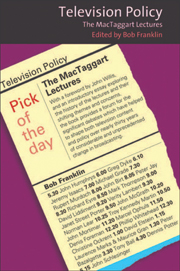Book contents
- Frontmatter
- Contents
- Acknowledgements
- Foreword
- Introduction
- The James MacTaggart Lectures
- TV Drama: The Case against Naturalism
- Naturalism and Television
- Taboos in Television
- Signposting Television in the 1980s: The Fourth Television Channel
- Television Drama, Censorship and the Truth
- The Day after Tomorrow: The Future of Electronic Publishing
- The Primacy of Programmes in the Future of Broadcasting
- Reflections on Working in Film and Television
- ‘Opening up the Fourth Front’: Micro Drama and the Rejection of Naturalism
- Power and Pluralism in Broadcasting
- Ethics, Broadcasting and Change: The French Experience
- Freedom in Broadcasting
- Deregulation and Quality Television
- The Future of Television: Market Forces and Social Values
- The Future of the BBC
- Occupying Powers
- A Culture of Dependency: Power, Politics and Broadcasters
- Talent versus Television
- A Glorious Future: Quality Broadcasting in the Digital Age
- Rewarding Creative Talent: The Struggle of the Independents
- Television versus the People
- Public-Interest Broadcasting: A New Approach
- A Time for Change
- The Soul of British Television
- Television's Creative Deficit
- Freedom of Choice: Public-Service Broadcasting and the BBC
- First Do No Harm
- Appendix A Edinburgh International Television Festival, 29 August–2 September 1977: Programme
- Appendix B Précis of Ted Turner, James MacTaggart Lecture 1982; Dr Jonathan Miller, James MacTaggart Lecture 1983
- Index
Talent versus Television
from The James MacTaggart Lectures
Published online by Cambridge University Press: 05 August 2013
- Frontmatter
- Contents
- Acknowledgements
- Foreword
- Introduction
- The James MacTaggart Lectures
- TV Drama: The Case against Naturalism
- Naturalism and Television
- Taboos in Television
- Signposting Television in the 1980s: The Fourth Television Channel
- Television Drama, Censorship and the Truth
- The Day after Tomorrow: The Future of Electronic Publishing
- The Primacy of Programmes in the Future of Broadcasting
- Reflections on Working in Film and Television
- ‘Opening up the Fourth Front’: Micro Drama and the Rejection of Naturalism
- Power and Pluralism in Broadcasting
- Ethics, Broadcasting and Change: The French Experience
- Freedom in Broadcasting
- Deregulation and Quality Television
- The Future of Television: Market Forces and Social Values
- The Future of the BBC
- Occupying Powers
- A Culture of Dependency: Power, Politics and Broadcasters
- Talent versus Television
- A Glorious Future: Quality Broadcasting in the Digital Age
- Rewarding Creative Talent: The Struggle of the Independents
- Television versus the People
- Public-Interest Broadcasting: A New Approach
- A Time for Change
- The Soul of British Television
- Television's Creative Deficit
- Freedom of Choice: Public-Service Broadcasting and the BBC
- First Do No Harm
- Appendix A Edinburgh International Television Festival, 29 August–2 September 1977: Programme
- Appendix B Précis of Ted Turner, James MacTaggart Lecture 1982; Dr Jonathan Miller, James MacTaggart Lecture 1983
- Index
Summary
The theme of this lecture is the ‘crisis’ facing British television triggered by the departure of ‘talent’ – by which Janet Street-Porter means ‘everyone who makes a difference to what hits the screen’. The cause of this malaise is television management, which has typically been composed of ‘“M” people’ – ‘Middle-class, Middle-brow, Middle-aged and Male, Masonic in their tendencies and, not to put to fine a point on it, fairly Mediocre.’ The final problem with M people is that there have ‘always been too many of them’.
The other problem with television is its structure. Senior managers, moreover, have lost any sense of purpose and have become ‘conservative, risk-averse caretakers of creaky structures and out of date formula shows’. Perhaps unsurprisingly, audiences for such programming are diminshing. Talent itself has contributed to the malaise in two ways. First, by cynically linking ‘commerce and crap’, talent has failed to recognise that making the highest quality programmes for the most discerning audiences will generate the greatest opportunities. Second, talent seeking promotion has typically moved into management for higher pay. Structures must be put in place which reward creative people for staying in creative jobs where they can deliver most value.
- Type
- Chapter
- Information
- Television PolicyThe MacTaggart Lectures, pp. 183 - 190Publisher: Edinburgh University PressPrint publication year: 2005

